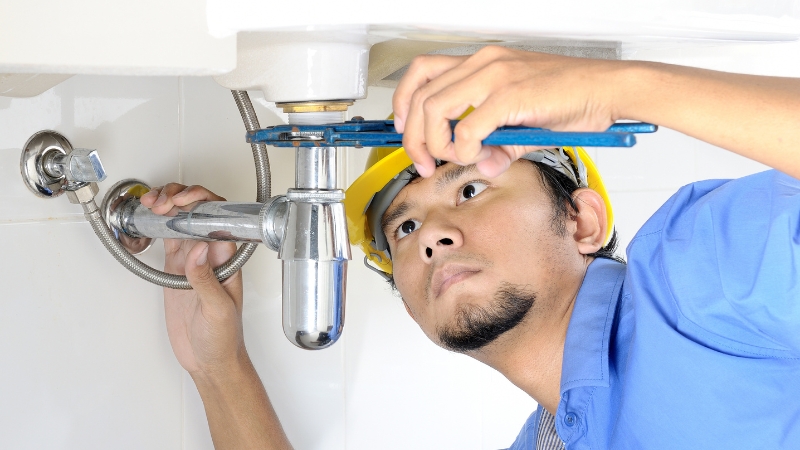Picture this: it’s a calm evening, and you’re enjoying your favorite TV show when suddenly, disaster strikes – a plumbing emergency! Panic sets in as water gushes from a burst pipe, flooding your home. In moments like these, staying calm and taking immediate action can make all the difference.
We’ll help you understand why quick action is crucial and how to assess the situation effectively. You’ll also discover the potential risks and damages that can occur if not handled promptly. By being prepared, you can minimize stress and damage during an emergency. So buckle up as we dive into what you need to know when faced with a plumbing crisis.
Table of Contents
ToggleI. Understanding Common Plumbing Emergencies:
Recognize Common Plumbing Emergencies
Plumbing emergencies can happen when you least expect them. Burst pipes, overflowing toilets, and water leaks are some of the most common plumbing issues that require immediate attention. These emergencies can cause significant damage to your home if not addressed promptly.
Understand the Causes
It’s important to understand the causes behind these plumbing emergencies. Frozen pipes during winter months can lead to bursts, while clogged drains or sewer mains can result in overflowing toilets or sinks. Water leaks may occur due to deteriorating pipes or faulty plumbing fixtures. Being aware of these potential causes can help you take preventive measures and minimize the risk of emergencies.
Learn About the Signs
Knowing the signs that indicate a plumbing emergency is crucial for prompt action. Look out for gurgling sounds coming from drains, foul odors, slow drainage, or sudden drops in water pressure. These indicators suggest underlying issues that may escalate into full-blown emergencies if left unattended.
Familiarize Yourself with Consequences
Ignoring or mishandling plumbing emergencies can have severe consequences. Water damage from burst pipes can lead to structural issues and mold growth, posing health risks for you and your family. Gas leaks are particularly dangerous and require immediate evacuation followed by professional assistance.
Dealing with a plumbing emergency for the first time can be overwhelming, but understanding common problems and their causes will help you respond effectively. Remember to stay calm and contact a licensed plumber as soon as possible to mitigate any further damage.
II. Immediate Responses to Plumbing Emergencies:
Shut Off the Main Water Supply
Knowing how to shut off the main water supply is crucial when dealing with a plumbing emergency. This action can help prevent further damage to your plumbing system and minimize the impact of the issue. Locate the main water valve in your home, usually found near the water meter or where the main water line enters your property. Turn it clockwise to shut off the water flow.
Basic Troubleshooting Techniques
While waiting for professional help to arrive, it’s helpful to have some basic troubleshooting techniques up your sleeve. These can be used for minor issues that don’t require immediate attention from a plumber. For example:
- If you have a leaky faucet, try tightening it with a wrench.
- If you’re experiencing low water pressure, check if any spigots or faucets are partially closed.
- In case of frozen pipes, use a hairdryer or warm towels to thaw them gently.
Essential Tools for Emergencies
Having essential tools on hand during a plumbing emergency can save you time and money. Here are some tools you should consider having in your toolbox:
- Adjustable wrench: Useful for tightening or loosening fittings.
- Plunger: Effective for clearing clogged drains and toilets.
- Pipe wrench: Ideal for gripping and turning pipes.
- Pipe tape: Helps create watertight seals on threaded connections.
Calling an Emergency Plumber
While some plumbing emergencies can be resolved on your own, others require professional assistance. It’s important to know when it’s necessary to call an emergency plumber:
- Gas leaks: If you suspect a gas leak, evacuate immediately and call both emergency services and a professional plumber.
- Burst pipes: A burst pipe can cause extensive damage within minutes; contacting an emergency plumber is crucial.
- Sewer backups: Foul odors or sewage coming up through drains indicate a sewer backup, which requires immediate attention.
Remember, quick action and the right knowledge can make all the difference. By knowing how to shut off the main water supply, employing basic troubleshooting techniques, having essential tools on hand, and recognizing when to call an emergency plumber, you’ll be better prepared to handle unexpected plumbing issues.
III. Preventive Measures and Maintenance:
To avoid future plumbing emergencies, it’s crucial to implement regular maintenance practices. Here are some preventive measures you can take to keep your plumbing system in good shape:
Implement Regular Maintenance Practices
- Inspect pipes periodically for leaks or corrosion, as these can lead to major issues if left unaddressed.
- Check the water pressure in your home regularly to ensure it is within the recommended range.
- Keep an eye on your water bill for any sudden spikes, which could indicate a hidden leak.
Understand the Importance of Proper Insulation
- In colder climates, proper insulation is essential to prevent frozen pipes. Ensure that exposed pipes are well-insulated to protect them from freezing and bursting.
Learn About Drain Cleaning Techniques
- Clogged drains are a common plumbing issue that can lead to backups and costly repairs. Familiarize yourself with drain cleaning techniques such as using a plunger or natural remedies like baking soda and vinegar.
Discover Tips for Preventing Common Plumbing Issues
- Avoid pouring grease or oil down the drain, as they can solidify and cause blockages.
- Use hair catchers in shower drains to prevent hair buildup.
- Be mindful of what you flush down the toilet; only toilet paper should be flushed.
Remember, while these preventive measures can help minimize the risk of plumbing emergencies, it’s always best to consult a professional plumber for comprehensive maintenance services.
IV. Dealing with Water Damage:
Water damage can have significant consequences for both your property and your health. It’s crucial to understand how to handle the aftermath of a plumbing emergency to minimize further damage and ensure a safe environment.
Understand potential consequences
Water damage can lead to structural issues, mold growth, and compromised electrical systems. It can pose health risks such as respiratory problems and allergies. Being aware of these potential consequences will help you take appropriate action promptly.
Safely remove standing water
After a plumbing emergency, it’s essential to remove any standing water from affected areas as quickly as possible. Here are some steps to safely remove standing water:
- Turn off the main water supply: Locate the main water meter or shut-off valve and turn it off to prevent further flooding.
- Use buckets or a wet/dry vacuum: Scoop out the excess water using buckets or use a wet/dry vacuum designed for water removal.
- Dispose of the water properly: Pour the collected water down drains or use outdoor drainage options.
Employ effective drying techniques
Drying out the affected areas is crucial in preventing mold growth and further damage. Consider these techniques:
- Open windows and doors: Increase ventilation by opening windows and doors to allow fresh air circulation.
- Use fans and dehumidifiers: Place fans strategically to promote airflow, while dehumidifiers help reduce moisture levels in the air.
- Remove wet materials: Take out any wet carpets, furniture, or other items that could retain moisture.
Insurance coverage options
It’s important to be aware of your insurance coverage related to water damage restoration. Some policies may cover repairs caused by sudden plumbing emergencies, while others may require specific endorsements or additional coverage options.
Remember that dealing with water damage after a plumbing emergency requires immediate action for effective mitigation. By understanding the potential consequences, safely removing standing water, employing proper drying techniques, and being aware of insurance coverage options, you can navigate the aftermath more effectively.
Key takeaways for dealing with a plumbing emergency
We discussed common plumbing emergencies, immediate responses you should take, preventive measures and maintenance tips, as well as how to deal with water damage. By understanding these key points, you’ll be better equipped to handle any unexpected plumbing issues that may arise in your home.
Remember, when faced with a plumbing emergency, it’s crucial to remain calm and take swift action. Don’t hesitate to reach out to professional plumbers if needed. Regular maintenance and preventive measures can help minimize the chances of emergencies occurring in the first place. By implementing these strategies and being prepared, you can ensure that your home remains safe and protected from potential plumbing disasters.
FAQs
1. How do I find a reliable plumber?
Finding a reliable plumber is essential for handling your plumbing needs effectively. Start by asking friends or family for recommendations. You can also check online review platforms or ask for referrals from local hardware stores or real estate agents.
2. What should I do if I have a burst pipe?
If you have a burst pipe, immediately turn off the main water supply valve in your home to prevent further damage. Then contact an emergency plumber who can quickly repair or replace the damaged pipe.
3. Are there any preventive measures I can take to avoid future plumbing emergencies?
Yes! Regularly inspecting your pipes and fixtures for leaks or signs of damage is crucial in preventing emergencies. Avoiding flushing non-flushable items down toilets and practicing proper drain maintenance can go a long way in preventing clogs and backups.
4. Can I fix minor plumbing issues myself?
While some minor issues like unclogging drains can be handled by homeowners using basic tools like plungers or drain snakes, it’s important not to attempt complex repairs or installations without proper knowledge. Doing so may worsen the problem and lead to more expensive repairs in the long run.
5. How often should I schedule plumbing maintenance?
It’s recommended to schedule plumbing maintenance at least once a year to ensure everything is in working order. Regular inspections can help identify potential issues early on and save you from costly repairs down the line.
Experience Rapid Response to Plumbing Emergencies with Garcia Plumbing and Home Restoration!
We recognize the urgency and stress that a plumbing emergency can bring to your household. Our team of certified professionals is dedicated to providing prompt and efficient Plumbing Emergency services, ensuring your home’s plumbing system is restored and functional.
At Garcia Plumbing and Home Restoration, we do more than just fix leaks; we provide peace of mind in crisis situations. Our reputation in Contra Costa County is built on reliable quality, unmatched expertise, and the satisfaction of numerous clients. Don’t let a plumbing emergency disrupt your life. Contact us today for exceptional Plumbing Emergency services and secure a swift, effective solution for your home!




